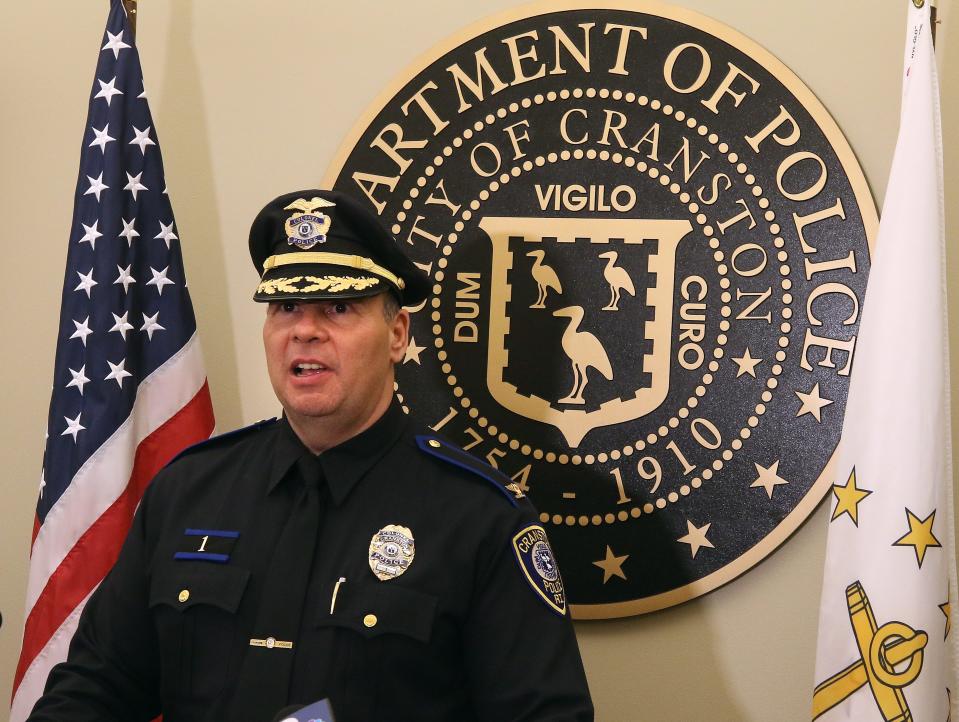Cranston leads the state in confiscating firearms under RI's red flag law
CRANSTON — In the almost four years since Rhode Island adopted a "red flag" law to try to avert tragedies, a single police department has confiscated 174 firearms from 42 individuals.
Cranston Police Capt. Carl Ricci said privacy laws prevent him from disclosing too many details, but one case involved "a worker" who threatened to harm his co-workers and then commit suicide.
Another involved a man who texted a friend a photo of himself holding a Smith & Wesson pistol in his mouth.
More: Are existing gun laws being enforced in RI? New report provides answers

In a third case, a man sent a letter to the federal courthouse threatening harm to undisclosed Cranston police.
In all, Ricci said, the Cranston Police Department has won 42 of the 43 "Extreme Risk Protection Orders" it has requested from the state court system since the 2018 passage of the law aimed at removing guns from violence-prone individuals at "imminent'' risk of killing themselves or others.
More: Gun control is about to take center stage again at RI State House. Here's what's proposed.
Cranston police say most cases involved domestic violence
Unlike other gun-crime cases in the courts, the vast majority of the firearms confiscated by Cranston police were legally obtained. And most of the cases involved what Ricci described as domestic violence.
As of this week, 10 of those orders are still in effect, prohibiting those named from purchasing or possessing firearms.
Statistics provided to The Providence Journal by the state court system this past week indicate the Cranston Police Department has been the most aggressive in the state in enforcing the better-safe-than-sorry law.
The 2018 passage of the law — along with a ban on the kinds of "bump-stock'' devices that enabled a lone gunman to kill 58 concert-goers in Las Vegas — came in the wake of the Las Vegas massacre and high-school shootings that left a trail of death in Parkland, Florida, and Sante Fe, Texas.
More: Jailed Burrillville man accused of amassing arsenal as drug user, pleads not guilty
More: Man in critical condition after being shot multiple times outside Providence nightclub
The lobbying arm of the National Rifle Association fought passage of both bills, warning on its website that the "red flag" bill would allow the confiscation of guns "under the guise of 'extreme risk' protection orders ... with few legal protections for those who may be falsely accused."
But Linda Finn, then president of the Rhode Island Coalition Against Gun Violence, surmised that was a year that state lawmakers "felt public pressure to 'do' something ... The red flag also responds to the narrative that it is the mentally ill that cause all the gun violence."
Under the law, state or local police could petition the Superior Court to issue an “extreme risk protection order” upon receipt of “credible information” of a significant and imminent risk. There would be a penalty of up to five years in jail and a $5,000 fine for knowingly providing false information.
A judge could issue a temporary gun-removal order, but a hearing would be required within 14 days to determine if a one-year ban on buying or possessing a firearm was warranted.
More: RI ban on stun guns and Tasers is unconstitutional, judge rules
116 'Extreme Risk Protection Orders' statewide since law passed in 2018
In the years since it was passed, state and local police requested — and in most cases obtained — 116 "Extreme Risk Protection Orders."
Cranston has used the law most aggressively; Cumberland, 12 times; Johnston, 10 times; Providence, seven times; Coventry, six times; Woonsocket, four times; Warwick and Barrington, twice each; and most other communities, once or twice, if at all.
The records of all of these cases are sealed, so it is unclear what prompted each of the actions.
In the vast majority of the cases that were filed, a judge at the very least issued a temporary order allowing police to confiscate firearms, and in most, extended the order for a year subject to subsequent review.
It is not possible to tell whether firearms were seized in each case, because the court recording system says: "proof of service as to seizure not returned" in most cases, including those where a protection order was issued.
More: Another illustration of public safety on Providence streets in 2021: Record gun seizure.
Court spokesman Craig Berke said there is no requirement that a police department report back, because "we are not tracking the firearms that were seized. We track the orders."
In only 17 cases is it clear that no firearms were seized. One-year reviews have been scheduled over the next year in 26 cases, still under active protection orders.
Only three red flag petitions in the court data-run were marked as "denied." One had been filed by the state police in October 2019, one by the Town of Warren in September 2018, and another in Johnston in 2021..
Why so many firearms confiscated in Cranston?
Asked last week what would explain his city's larger-than-average number of "Extreme Protection Orders," Cranston Police Chief Michael J. Winquist said: "I don't think our community is really any different than your average community. I don't think that has anything to do with it.
"But we are very proactive in this particular area because we know, obviously, the consequences of what can happen if a firearm is in the wrong hands ... or they are able to go buy a firearm when they are not really, possibly in the right mental state.
"I think it comes down sometimes to training and awareness of the law and how to use the law properly," he said.
This article originally appeared on The Providence Journal: Cranston leads Rhode Island in confiscated firearms under red flag law

